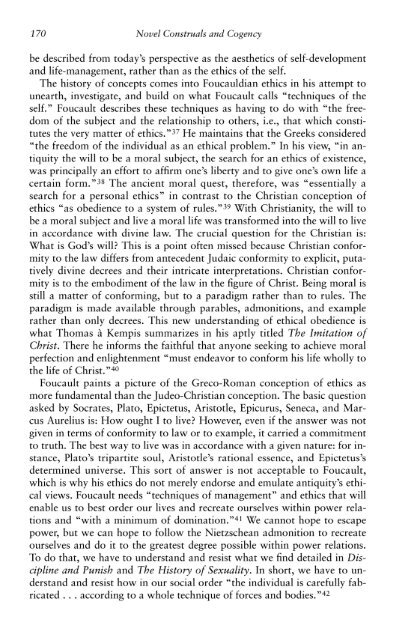Starting with Foucault: An Introduction to Genealogy, Second Edition
Starting with Foucault: An Introduction to Genealogy, Second Edition
Starting with Foucault: An Introduction to Genealogy, Second Edition
You also want an ePaper? Increase the reach of your titles
YUMPU automatically turns print PDFs into web optimized ePapers that Google loves.
2 70 Novel Cc;lns%rgaks and Cc~gee~ybe described from <strong>to</strong>day" perspective as the aesthetics of self-developmentand life-management, rather than as the ethics of the self.The his<strong>to</strong>ry of concepts comes in<strong>to</strong> Foucauldian ethics in his attempt <strong>to</strong>unearth, investigate, and build on what <strong>Foucault</strong> calls "kchniques of theself.'Tooucault describes these techniques as having <strong>to</strong> do <strong>with</strong> '"the freedomof the subject: and the relationship <strong>to</strong> others, i.e., that which constitutesthe very matter of ethics,""" He maintains that the Greeks considered"the freedom of the individual as an ethical problem." In his view, "in antiquitythe will <strong>to</strong> he a moral subject, the search for an ethics of existence,was principally an effort <strong>to</strong> affirm one's liberty and <strong>to</strong> give one's own life acertain farm."38 The ancient moral quest, therefure, was ""essentially asearch far n personal ethics" in contrast <strong>to</strong> the Christian conception ofethics ""as obedience <strong>to</strong> a syscem of rules,'"9 With Christianity, &e will <strong>to</strong>be it moral subject and live a moral life was transformed in<strong>to</strong> the will <strong>to</strong> livein accordance <strong>with</strong> divine law. The crucial question for the Christian is:What is Cod's will? This is a point often missed because Christian confarmity<strong>to</strong> the law differs from antecedent Judaic conformity <strong>to</strong> explicit, putativelydivine decrees and their intricate interpretations, Christian conformityis <strong>to</strong> the embadinnem of the law in the figure of Christ. Being moral isstill a matter of conforming, but <strong>to</strong> a garadigrn rather than <strong>to</strong> rules, Theparadigm is made available through parables, admonitions, and examplerather than only decrees. This new understanding of ethical obedience iswhat Thomas B Kernpis summarizes in his aptly titled Tbe Imiaticrn ofChP.ist, Thcre he informs the faithhi that anyone seeking <strong>to</strong> achieve moralperfection and enlightenment "must endeavor <strong>to</strong> conform bis life wkally <strong>to</strong>the life of Christ."40Fctucauit paints a picture uf the Creco-Roman conception of ethics asmore fundamental than the Judeo-Christian conception. The basic questionasked by f ocrates, Pla<strong>to</strong>, Epictetus, Aris<strong>to</strong>tle, Epicusus, Seneca, and MarcusAurelius is: How ought I <strong>to</strong> live? Mowever, even if the answer was notgiven in terms of sonformi~ <strong>to</strong> law or <strong>to</strong> example, it carried a commitment<strong>to</strong> truth. The best w y <strong>to</strong> live was in accordance <strong>with</strong> a given natwe: for instance,Pla<strong>to</strong>" tripartite sou!, Aris<strong>to</strong>tle" rational essence, and Epictetus'sdetermined universe. This sort of answer is not acceptable <strong>to</strong> Foucatrlt,vvhich is why his ethics do nor merely endorse and emulate antiquity% ethicalviews, <strong>Foucault</strong> needs ""techniques of management" and ethics tbat willenable us <strong>to</strong> best order our lives and recreate oursefves <strong>with</strong>in power relationsand '"<strong>with</strong> a minimum of domination."41 We cannot hope <strong>to</strong> escapepower, hut we can hope <strong>to</strong> follow the Nietzschcan admonition <strong>to</strong> recreateoursefves and do it <strong>to</strong> the greatest degree possible <strong>with</strong>in power relations.To do tbat, we have <strong>to</strong> understand and resist what we find detailed in Discipli~eamd Punish and The Hist.ory of Sexunlity, In short, we have <strong>to</strong> understandand resist how in our social order ""the indivld~~al is carefully fah-ricated . . . according <strong>to</strong> a whole technique of forces and bodies*"'""


